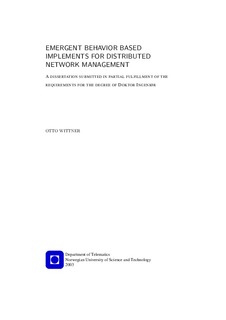| dc.contributor.advisor | Helvik, Bjarne E | nb_NO |
| dc.contributor.author | Wittner, Otto | nb_NO |
| dc.date.accessioned | 2014-12-19T14:11:29Z | |
| dc.date.available | 2014-12-19T14:11:29Z | |
| dc.date.created | 2008-01-02 | nb_NO |
| dc.date.issued | 2003 | nb_NO |
| dc.identifier | 123126 | nb_NO |
| dc.identifier.isbn | 82-471-5649-0 | nb_NO |
| dc.identifier.uri | http://hdl.handle.net/11250/261466 | |
| dc.description.abstract | Network and system management has always been of concern for telecommunication and computer system operators. The need for standardization was recognised already 20 years ago, hence several standards for network management exist today. However, the ever-increasing number of units connected to networks and the ever-increasing number of services being provided results in significant increased complexity of average network environments. This challenges current management systems. In addition to the general increase in complexity the trend among network owners and operators of merging several single service networks into larger, heterogeneous and complex full service networks challenges current management systems even further. The full service networks will require management systems more powerful than what is possible to realize basing systems purely on todays management standards. This thesis presents a distributed stochastic optimization algorithm which enables implementations of highly robust and efficient management tools. These tools may be integrated into management systems and potentially make the systems more powerful and better prepared for management of full service networks.
Emergent behavior is common in nature and easily observable in colonies of social insects and animals. Even an old oak tree can be viewed as an emergent system with its collection of interacting cells. Characteristic for any emergent system is how the overall behavior of the system emerge from many relatively simple, restricted behaviors interacting, e.g. a thousand ants building a trail, a flock of birds flying south or millions of cells making a tree grow. No centralized control exist, i.e. no single unit is in charge making global decisions. Despite distributed control, high work redundancy and stochastic behavior components, emergent systems tend to be very efficient problem solvers. In fact emergent systems tend to be both efficient, adaptive and robust which are three properties indeed desirable for a network management system. The algorithm presented in this thesis relates to a class of emergent behavior based systems known as swarm intelligence systems, i.e. the algorithm is potentially efficient, adaptive and robust.
On the contrary to other related swarm intelligence algorithms, the algorithm presented has a thorough formal foundation. This enables a better understanding of the algorithm’s potentials and limitations, and hence enables better adaptation of the algorithm to new problem areas without loss of efficiency, adaptability or robustness. The formal foundations are based on work by Reuven Rubinstein on cross entropy driven optimization. The transition from Ruinstein’s centralized and synchronous algorithm to a distributed and asynchronous algorithm is described, and the distributed algorithm’s ability to solve complex problems (NP-complete) efficiently is demonstrated.
Four examples of how the distributed algorithm may be applied in a network management context are presented. A system for finding near optimal patterns of primary/backup paths together with a system for finding cyclic protection paths in mesh networks demonstrate the algorithm’s ability to act as a tool helping management system to ensure quality of service. The algorithm’s potential as a management policy implementation mechanism is also demonstrated. The algorithm’s adaptability is shown to enable resolution of policy conflicts in a soft manner causing as little loss as possible. Finally, the algorithm’s ability to find near optimal paths (i.e. sequences) of resources in networks of large scale is demonstrated. | nb_NO |
| dc.language | eng | nb_NO |
| dc.publisher | Fakultet for informasjonsteknologi, matematikk og elektroteknikk | nb_NO |
| dc.relation.ispartofseries | Dr.ingeniøravhandling, 0809-103X; 0806-103X | nb_NO |
| dc.relation.haspart | Helvik, Bjarne E.; Wittner, Otto. Using the Cross-Entropy Method to Guide/Govern Mobile Agent’s Path Finding in Networks. Third International Workshop on Mobile Agents for Telecommunication Applications, MATA 2001, 2001. | nb_NO |
| dc.relation.haspart | Wittner, Otto; Helvik, Bjarne E.. Cross Entropy Guided Ant-like Agents Finding Dependable Primary/Backup Path Patterns in Networks. Congress on Evolutionary Computation, CEC 2002, 2002. | nb_NO |
| dc.relation.haspart | Wittner, Otto; Helvik, Bjarne E.. Robust Implementation of Policies Using Ant-like Agents. The Network Control and Engineering for QoS, Security and Mobility with focus on Policy- based Networking IFIP and IEEE Conference, Net-Con’2002, 2002. | nb_NO |
| dc.subject | Network management | en_GB |
| dc.subject | emergent behavior | en_GB |
| dc.subject | emergent systems | en_GB |
| dc.subject | swarm intelligence | en_GB |
| dc.subject | mobile agents | en_GB |
| dc.subject | multi-criteria optimization | en_GB |
| dc.subject | cross entropy | en_GB |
| dc.subject | rare events | en_GB |
| dc.subject | routing | en_GB |
| dc.subject | protection switching | en_GB |
| dc.subject | policy management | en_GB |
| dc.subject | policy conflicts | en_GB |
| dc.subject | network | en_GB |
| dc.subject | resource location | en_GB |
| dc.subject | large scale swarm intelligence | en_GB |
| dc.subject | TECHNOLOGY: Information technology: Telecommunication | en_GB |
| dc.title | Emergent behavior based implements for distributed network management | nb_NO |
| dc.type | Doctoral thesis | nb_NO |
| dc.source.pagenumber | 165 | nb_NO |
| dc.contributor.department | Norges teknisk-naturvitenskapelige universitet, Fakultet for informasjonsteknologi, matematikk og elektroteknikk, Institutt for telematikk | nb_NO |
| dc.description.degree | dr.ing. | nb_NO |
| dc.description.degree | dr.ing. | en_GB |
